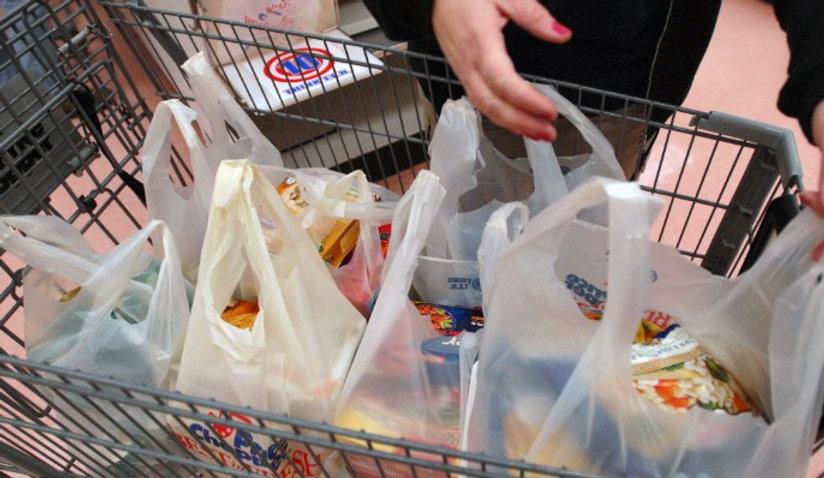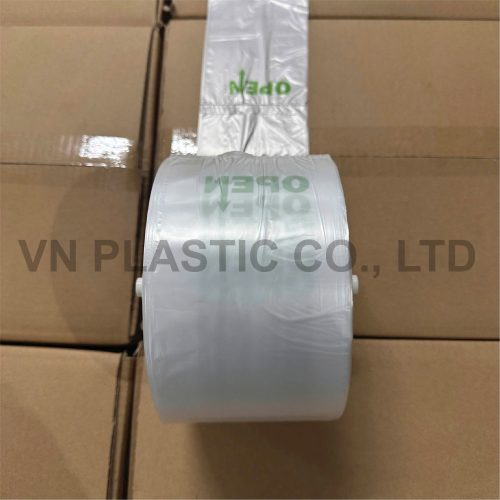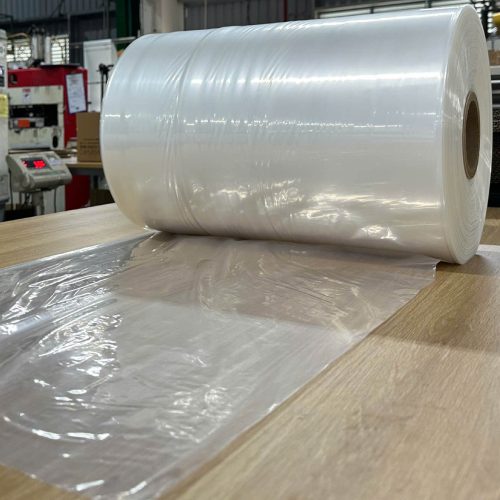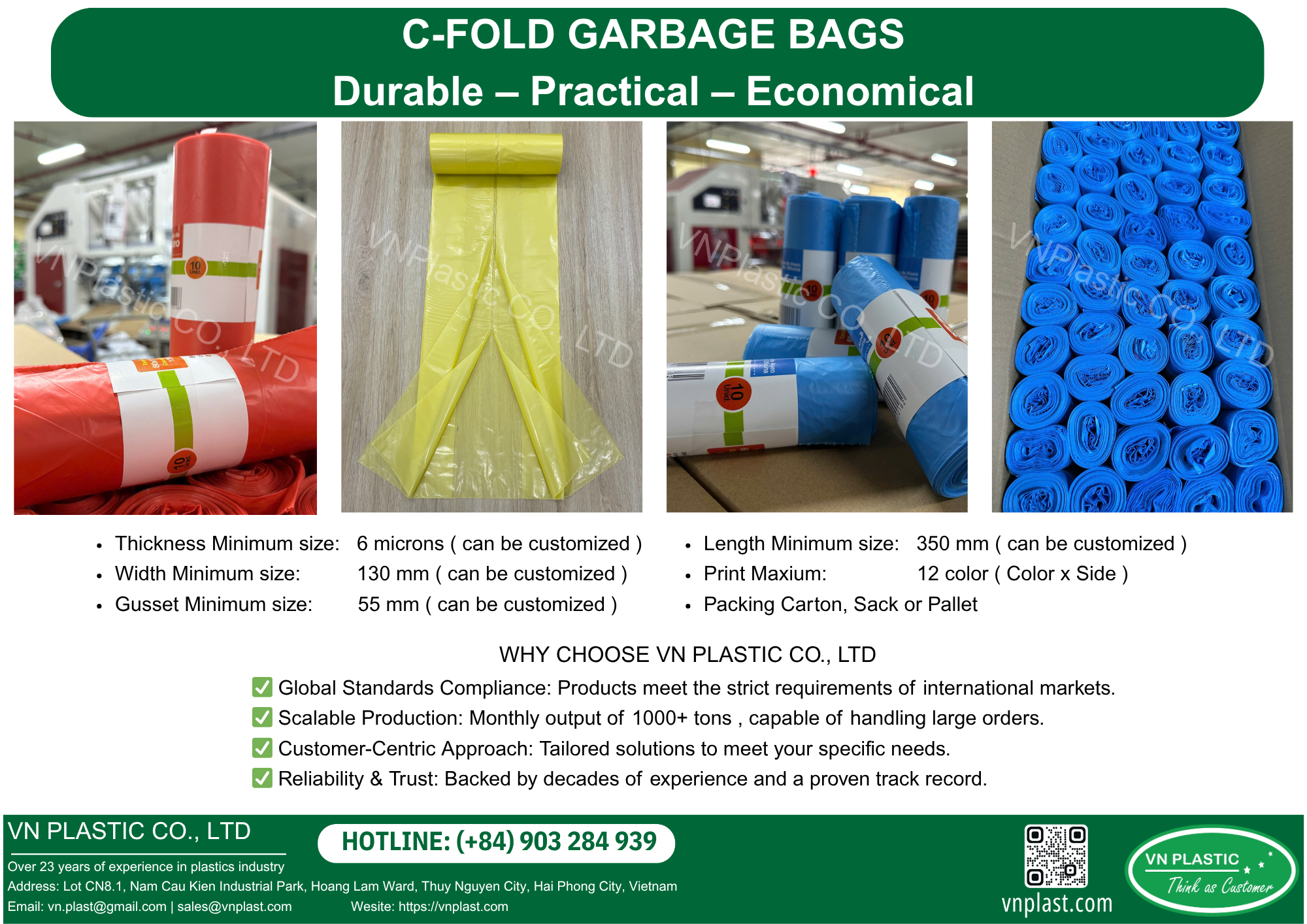Vietnam has emerged as a significant player in the global plastic shopping bag industry, exporting a diverse range of products to markets worldwide. The country’s thriving plastic shopping bag export sector has been a driving force behind its economic growth, contributing substantially to GDP, employment opportunities, and foreign exchange earnings.
Introduction

Overview of Plastic Shopping Bags Export in Vietnam
Vietnam’s plastic shopping bag industry has witnessed remarkable growth in recent years, catering to the increasing global demand for affordable and convenient packaging solutions. The country’s manufacturing capabilities encompass a wide spectrum of plastic shopping bag designs, sizes, and functionalities, ranging from basic grocery bags to specialized bags for retail, catering, and industrial purposes. With a strong focus on quality, cost-effectiveness, and innovation, Vietnamese manufacturers have secured a prominent position in the international market.
Importance of the Plastic Shopping Bags Industry in Vietnam
The plastic shopping bags industry holds immense importance for the Vietnamese economy, contributing significantly to:
- Employment opportunities: The industry provides direct and indirect employment to a large workforce across the production, manufacturing, and distribution chains, boosting local economies and improving living standards.
- Foreign exchange earnings: Exports of plastic shopping bags generate substantial foreign exchange earnings, contributing to the country’s trade surplus and economic stability, enabling investments in infrastructure and development projects.
- Industrial development: The plastic shopping bag industry serves as a catalyst for the growth and development of associated industries like plastics manufacturing, printing, and packaging, fostering innovation and competitiveness.
- International trade: Vietnam’s plastic shopping bag exports have facilitated trade partnerships with global buyers, strengthening the country’s position in the international market and promoting economic integration.
Current Status of Plastic Shopping Bags Export in Vietnam
Statistics on Plastic Shopping Bags Export in Vietnam
The Vietnamese plastic shopping bag export sector has witnessed impressive growth over the years. According to recent official statistics, the country exported over $1.2 billion worth of plastic shopping bags in 2023 alone, marking a significant increase from the previous year’s figures. The top export destinations included:
- United States (25%)
- Japan (18%)
- Germany (12%)
- United Kingdom (10%)
- Canada (8%)
These figures highlight the global demand for Vietnamese plastic shopping bags and the industry‘s ability to cater to diverse international markets.
Major Markets for Vietnamese Plastic Shopping Bags
The major markets for Vietnamese plastic shopping bags encompass a wide range of countries across Asia, Europe, North America, and Africa.
Asia: Vietnam has established a strong foothold in the Asian market, with countries like Japan, South Korea, and China being major importers of Vietnamese plastic shopping bags. The proximity to these markets and the region growing retail and consumer sectors have driven the demand for affordable and high-quality packaging solutions.
Europe: The European market presents significant opportunities for Vietnamese exporters, with countries like Germany, the United Kingdom, France, and Italy showing increasing demand for plastic shopping bags. The emphasis on convenience and sustainability in Europe has fueled the need for eco-friendly plastic shopping bag options, which Vietnamese manufacturers have been quick to adapt to.
North America: The North American market, particularly the United States and Canada, remains a considerable market for Vietnamese plastic shopping bags, driven by the increasing reliance on convenience and disposable packaging in the retail and e-commerce sectors.
Africa: Vietnam’s plastic shopping bag exports to Africa are growing steadily, with emerging economies like South Africa, Nigeria, and Egypt presenting promising market potential. The rise of urbanization and the expanding consumer base in these regions have contributed to the heightened demand for affordable packaging solutions.
Trends and Forecasts for Plastic Shopping Bags Export in Vietnam
The Vietnamese plastic shopping bag industry is witnessing several key trends and forecasts:
- Growing demand for eco-friendly options: Consumers are increasingly demanding sustainable and environmentally friendly packaging solutions, driving the demand for eco-friendly plastic shopping bags made from biodegradable materials like cornstarch or plant-based polymers.
- Innovation in design and functionality: Exporters are focusing on developing innovative designs and functionality in their plastic shopping bags, incorporating features like reusable options, carrying handles with improved strength, and waterproof materials to cater to diverse consumer needs.
- Focus on quality and safety: Vietnamese exporters are prioritizing quality control and implementing rigorous safety standards to meet international regulations and ensure consumer satisfaction, enhancing their competitiveness in the global market.
- Expansion into new markets: With the increasing globalization of trade, Vietnamese plastic shopping bag exporters are actively exploring new markets, particularly in emerging economies, where the demand for affordable packaging solutions is on the rise.
Factors Driving the Growth of Plastic Shopping Bags Export in Vietnam

Cost-effectiveness of Production in Vietnam
Vietnam offers a cost-effective production environment for plastic shopping bags, with several factors contributing to its competitive advantage:
- Lower labor costs: The availability of a skilled and affordable labor force in Vietnam has enabled manufacturers to maintain cost-effective production processes.
- Readily available raw materials: Vietnam’s strong petrochemical industry and access to imported raw materials like polyethylene and polypropylene have ensured a reliable supply chain for plastic shopping bag production.
- Tax incentives and government support: The Vietnamese government has implemented various tax incentives and support programs to promote the growth of the manufacturing sector, including the plastic shopping bag industry, making it an attractive destination for investors and manufacturers.
Increasing Demand for Eco-friendly Plastic Shopping Bags
The growing global emphasis on environmental sustainability has fueled the demand for eco-friendly plastic shopping bags made from biodegradable materials. Vietnamese manufacturers have been investing in research and development to produce these sustainable options, meeting the evolving needs of the market and positioning themselves as responsible suppliers.
Some of the eco-friendly materials used in the production of plastic shopping bags in Vietnam include:
- Biodegradable plastics derived from plant-based sources like corn starch, sugarcane, and cassava
- Recycled plastics, reducing the environmental impact and promoting a circular economy
- Oxo-biodegradable plastics that break down faster than traditional plastics under specific conditions
By offering eco-friendly alternatives, Vietnamese exporters have been able to tap into the growing demand for sustainable packaging solutions from environmentally conscious consumers and retailers worldwide.
Government Support and Regulations Promoting Plastic Shopping Bags Export
The Vietnamese government has implemented various measures to support the growth of the plastic shopping bag industry and promote its export potential:
- Trade agreements: Vietnam is actively engaging in free trade agreements with various countries, facilitating cross-border trade and reducing tariffs on plastic shopping bag exports. These agreements have opened up new markets and enhanced the competitiveness of Vietnamese exporters.
- Financial incentives: The government provides financial incentives and subsidies to manufacturers, promoting investment in technological upgrades and expansion of production capabilities, enabling them to meet the evolving demands of the global market.
- Export promotion programs: Government organizations and agencies are actively engaged in promoting Vietnamese plastic shopping bags in international markets, fostering trade partnerships and connecting exporters with potential buyers through trade fairs, exhibitions, and marketing campaigns.
- Regulatory framework: Vietnam has established a regulatory framework to ensure the quality and safety of plastic shopping bags, aligning with international standards and addressing concerns regarding environmental impact and sustainability.
These government initiatives have played a crucial role in supporting the growth and competitiveness of the plastic shopping bag export industry in Vietnam.
Challenges Faced by the Plastic Shopping Bags Industry in Vietnam

Despite the remarkable growth and success of the plastic shopping bag export industry in Vietnam, it faces several challenges that must be addressed to ensure its long-term sustainability and competitiveness.
Environmental Concerns and Backlash Against Plastic Usage
The global environmental movement has raised significant concerns about the harmful impact of plastic waste on ecosystems and marine life. This has led to a backlash against plastic usage, with calls for bans on single-use plastic items and a shift towards more sustainable alternatives. While Vietnam has made strides in promoting eco-friendly plastic shopping bag options, the industry must continue to address these environmental concerns and adapt to the changing consumer preferences and regulations.
Competition from Other Countries in the Region
Vietnam faces stiff competition from other countries in the region, such as China, Thailand, and Malaysia, which are also major producers and exporters of plastic shopping bags. These countries often have well-established supply chains, advanced manufacturing capabilities, and competitive pricing strategies. To maintain its market share and competitiveness, Vietnamese manufacturers need to continuously innovate, enhance product quality, and offer value-added products that differentiate them from their regional competitors.
Quality Control and Compliance Issues
Ensuring consistent quality and compliance with international regulations remains a crucial challenge for Vietnamese plastic shopping bag manufacturers. Non-compliance with safety standards, such as the presence of harmful chemicals or substandard materials, can lead to product recalls, damage the reputation of Vietnamese exporters, and hinder market access. Maintaining rigorous quality control measures and adhering to global standards is essential for the industry’s long-term success.
Strategies for Enhancing Plastic Shopping Bags Export in Vietnam
To address the challenges and capitalize on the growth opportunities in the plastic shopping bag export industry, Vietnamese manufacturers and policymakers should consider implementing the following strategies:
Investing in Research and Development for Innovative Products
To stay ahead of the competition and meet the evolving demands of the market, Vietnamese plastic shopping bag exporters should prioritize investment in research and development (RD) for innovative products. By focusing on developing cutting-edge solutions, such as advanced materials, customizable designs, and functional features, manufacturers can differentiate their products and create added value for customers.
Collaborating with academic institutions, research centers, and industry experts can help companies access new technologies and insights, enabling them to innovate and stay competitive in the global marketplace. RD efforts should also emphasize sustainability and eco-friendliness, aligning with the growing consumer preference for environmentally responsible packaging solutions.
Collaborating with International Partners for Market Expansion
Expanding into new markets and increasing market share require strong partnerships and collaborations with international stakeholders. By establishing strategic alliances with distributors, retailers, and packaging companies in target markets, Vietnamese plastic shopping bag exporters can access new sales channels, leverage existing networks, and enhance their global reach.
Participating in trade missions, industry conferences, and business matchmaking events can also facilitate connections with prospective buyers and partners, paving the way for growth and market expansion. By building mutually beneficial relationships with international partners, Vietnamese exporters can gain valuable market insights, address customer needs more effectively, and drive sustainable business growth.
Implementing Sustainable Practices in Production and Distribution
As sustainability becomes a critical factor in consumer purchasing decisions and regulatory requirements, Vietnamese plastic shopping bag manufacturers must embrace sustainable practices throughout their operations. Adopting eco-friendly materials, optimizing resource use, reducing waste generation, and implementing energy-efficient technologies can help companies minimize their environmental footprint and enhance their corporate social responsibility (CSR) commitments.
Certifications such as ISO 14001 for environmental management systems and eco-labels like the Forest Stewardship Council (FSC) certification can demonstrate a company’s commitment to sustainability and compliance with international standards. By integrating sustainable practices into production processes and supply chain management, Vietnamese exporters can attract environmentally conscious customers, meet market expectations, and contribute to a greener future.
Impact of Plastic Shopping Bags Export on the Vietnamese Economy
The plastic shopping bag export industry plays a significant role in the Vietnamese economy, contributing to economic growth, employment generation, and foreign exchange earnings. Understanding the impact of this industry is essential for policymakers, businesses, and stakeholders to make informed decisions and drive sustainable development.
Contribution to GDP and Employment Opportunities
The plastic shopping bag export industry contributes substantially to Vietnam’s gross domestic product (GDP) through manufacturing activities, exports, and related services. The sector’s economic contribution extends beyond direct production to include upstream industries, such as raw material suppliers, machinery manufacturers, and logistics providers, creating a multiplier effect on the economy.
Moreover, the industry is a vital source of employment, providing opportunities for skilled and unskilled workers across various stages of the value chain, from production and packaging to sales and distribution. Job creation in the plastic shopping bag sector helps alleviate unemployment, improve livelihoods, and enhance the country’s human capital development.
Foreign Exchange Earnings from Plastic Shopping Bags Export
Vietnamese plastic shopping bag exporters generate substantial foreign exchange earnings by selling their products to overseas markets. The industry’s export revenues contribute to the country’s balance of payments, strengthen its currency, and support trade stability. Foreign exchange reserves accumulated from plastic shopping bag exports provide financial security, liquidity, and flexibility for Vietnam’s economy, enabling it to manage external shocks and economic fluctuations effectively.
By diversifying export destinations, products, and marketing strategies, Vietnamese manufacturers can expand their export earnings, reduce dependency on specific markets, and increase their resilience to global market dynamics. Optimizing trade promotion efforts, leveraging preferential trade agreements, and enhancing product competitiveness can further boost foreign exchange inflows and enhance the industry’s contribution to Vietnam’s economic growth.
Social Implications of the Industry on Local Communities
The plastic shopping bag export industry has both positive and negative social implications for local communities in Vietnam. While the sector creates job opportunities, enhances income levels, and improves standards of living for workers and their families, it also raises socio-economic challenges that need to be addressed.
Issues such as occupational health and safety, labor rights, working conditions, and income inequality require attention to ensure fair and inclusive growth within the industry. Implementing ethical labor practices, promoting employee well-being, providing training and skill development opportunities, and fostering a supportive work environment are essential for creating a positive social impact and sustainable livelihoods in the plastic shopping bag sector.
Furthermore, engaging with local communities, supporting community development initiatives, and investing in social welfare programs can foster strong relationships, build trust, and enhance the industry’s social license to operate. By prioritizing social responsibility and community engagement, Vietnamese plastic shopping bag exporters can contribute positively to society, build resilience, and sustain long-term relationships with stakeholders.
Sustainability Initiatives in the Plastic Shopping Bags Industry
In response to growing environmental concerns and regulatory pressures, the plastic shopping bag industry in Vietnam is embracing sustainability initiatives to minimize its ecological footprint, promote recycling, and support circular economy principles. By adopting innovative practices and adopting eco-friendly technologies, manufacturers can mitigate the environmental impact of their operations and create value for society.
Adoption of Biodegradable and Recyclable Materials
One of the key sustainability initiatives in the plastic shopping bag industry is the widespread adoption of biodegradable and recyclable materials in product manufacturing. Vietnamese exporters are increasingly using bio-based plastics, compostable polymers, and recycled materials to produce eco-friendly shopping bags that degrade naturally and reduce waste accumulation.
Biodegradable plastics derived from renewable sources like plants offer a sustainable alternative to traditional fossil-based plastics, helping to minimize environmental pollution and resource depletion. By choosing materials that decompose safely in natural environments or industrial composting facilities, manufacturers can contribute to a cleaner, healthier planet and meet consumer demand for eco-conscious products.
Recycling programs also play a crucial role in supporting a circular economy model within the plastic shopping bag industry. By collecting used bags, recycling them into new products, and promoting closed-loop systems, manufacturers can reduce reliance on virgin materials, conserve resources, and minimize landfill waste. Encouraging consumers to participate in recycling initiatives, such as deposit-return schemes and collection points, can increase recycling rates, raise awareness about waste management, and foster a culture of sustainability in the community.
Waste Management and Recycling Programs
Effective waste management and recycling programs are essential components of sustainable practices in the plastic shopping bag industry. Vietnamese manufacturers are implementing comprehensive waste reduction strategies, including waste segregation, recycling facilities, and waste-to-energy technologies, to minimize the environmental impact of their operations and comply with regulations.
By investing in advanced waste management infrastructure, such as waste sorting equipment, shredders, and balers, companies can optimize their waste handling processes, increase recycling efficiency, and reduce landfill waste. Collaborating with waste management agencies, recycling partners, and government authorities can help manufacturers navigate complex waste regulations, secure permits, and implement best practices for sustainable waste disposal.
Furthermore, public awareness campaigns, educational outreach, and environmental stewardship initiatives can promote responsible consumption habits, encourage recycling behavior, and empower individuals to make environmentally conscious choices. By engaging with stakeholders, sharing best practices, and advocating for waste reduction policies, the plastic shopping bag industry in Vietnam can drive positive change, inspire collective action, and build a more sustainable future for all.
Corporate Social Responsibility Efforts in the Industry
Corporate social responsibility (CSR) has become a core component of sustainability initiatives in the plastic shopping bag industry, reflecting a commitment to ethical business practices, stakeholder engagement, and community development. Vietnamese manufacturers are increasingly integrating CSR principles into their operations, supply chains, and corporate culture to enhance their reputation, build trust, and create shared value.
CSR efforts in the industry encompass a wide range of activities, including:
- Supporting local communities through philanthropic programs, educational initiatives, and healthcare projects
- Empowering employees through training, career development opportunities, and workplace wellness programs
- Promoting diversity, equity, and inclusion in the workforce and fostering a culture of respect and equality
- Ensuring ethical sourcing practices, transparency, and compliance with labor standards and human rights principles
- Engaging with environmental organizations, advocacy groups, and government agencies to address sustainability challenges and promote industry-wide solutions
By practicing responsible business conduct, Vietnamese plastic shopping bag exporters can strengthen their social license to operate, build resilient supply chains, and create long-term value for society. By aligning CSR activities with business objectives and stakeholder expectations, companies can drive positive change, inspire trust, and contribute to sustainable development goals.
Future Outlook for Plastic Shopping Bags Export in Vietnam
Looking ahead, the future of plastic shopping bag export in Vietnam is filled with opportunities for growth, innovation, and sustainability. By leveraging technological advancements, embracing market trends, and setting ambitious sustainability goals, the industry can thrive in a competitive global landscape and secure its position as a leading exporter of plastic packaging solutions.
Potential for Growth and Diversification in Product Range
Vietnamese plastic shopping bag exporters have the potential to expand their product range, diversify their offerings, and enter new market segments to capture a larger share of the global market. By introducing specialized bags for specific industries, such as food and beverage, retail, e-commerce, and healthcare, manufacturers can cater to diverse customer needs, differentiate their products, and create niche market opportunities.
Innovations in design, functionality, and customization can also drive product differentiation and customer engagement, enabling exporters to meet changing preferences, enhance brand loyalty, and position themselves as preferred suppliers in targeted markets. By continuously exploring emerging trends, conducting market research, and adapting to consumer demands, Vietnamese manufacturers can stay agile, responsive, and competitive in the dynamic plastic shopping bag industry.
Technological Advancements Shaping the Industry
Technological advancements play a pivotal role in shaping the future of the plastic shopping bag industry, enabling manufacturers to optimize production processes, improve product quality, and reduce environmental impact. Automation, robotics, artificial intelligence, and data analytics are revolutionizing manufacturing operations, enhancing efficiency, and driving innovation in product development and distribution.
By investing in smart manufacturing technologies, digital solutions, and supply chain optimization tools, Vietnamese exporters can streamline operations, minimize waste, and maximize resource utilization, leading to cost savings and productivity gains. Adopting cloud-based systems, IoT devices, and predictive maintenance software can enable real-time monitoring, data-driven decision-making, and agile production planning, enhancing operational resilience and responsiveness.
Moreover, advancements in material science, polymer engineering, and packaging technology are fueling the development of sustainable alternatives to conventional plastics, such as biodegradable polymers, compostable films, and barrier coatings. By embracing these breakthroughs, Vietnamese manufacturers can stay at the forefront of innovation, meet regulatory requirements, and address consumer preferences for eco-friendly packaging solutions, securing a competitive edge in the global market.
Long-term Sustainability Goals and Targets
As the plastic shopping bag industry evolves and faces increasing scrutiny over its environmental impact, Vietnamese exporters are setting long-term sustainability goals and targets to drive positive change, reduce carbon footprint, and foster innovation. Embracing circular economy principles, zero-waste strategies, and life cycle assessments, manufacturers are committed to minimizing waste, conserving resources, and promoting sustainable production practices.
Key sustainability initiatives and targets in the industry include:
- Achieving carbon neutrality through energy-efficient operations, renewable energy sources, and emission reductions
- Implementing waste reduction and recycling programs to minimize environmental pollution and promote resource efficiency
- Enhancing product design for recyclability, reusability, and end-of-life disposal options
- Engaging with stakeholders, government bodies, and industry associations to advocate for policy reforms and industry-wide sustainability standards
By pursuing ambitious sustainability goals, incorporating eco-design principles, and measuring performance metrics, Vietnamese plastic shopping bag exporters can drive continuous improvement, demonstrate environmental leadership, and inspire industry-wide transformation. Collaboration, innovation, and shared accountability are essential for achieving a sustainable future for the plastic shopping bag industry in Vietnam and contributing to a circular economy model globally.
Conclusion
In conclusion, the plastic shopping bag export industry in Vietnam is a thriving sector with significant growth potential, driven by cost-effectiveness, sustainability initiatives, and government support. Despite facing challenges such as environmental concerns, competition, and quality control issues, Vietnamese manufacturers can overcome these obstacles by investing in RD, collaborating with international partners, and embracing sustainable practices.
By focusing on innovation, market expansion, and sustainability, the industry can enhance its competitiveness, drive economic growth, and create positive social impact in local communities. With a strategic outlook, technological innovation, and a commitment to long-term sustainability goals, Vietnamese plastic shopping bag exporters can navigate industry trends, seize growth opportunities, and shape a more sustainable future for the sector.
As the world embraces environmental consciousness and seeks sustainable packaging solutions, Vietnam’s plastic shopping bag industry has the opportunity to lead by example, demonstrate resilience, and inspire positive change. By embracing sustainability as a core value, prioritizing innovation, and fostering collaboration, Vietnamese exporters can position themselves as responsible industry leaders and contribute to a greener, more sustainable future for generations to come.
Sourcing by VNPLASTIC
Contact us for support any time!




